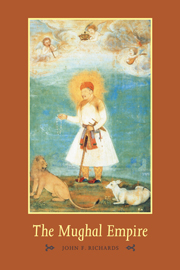Book contents
- Frontmatter
- Contents
- List of maps and tables
- General editor's preface
- Preface
- Introduction
- 1 Conquest and stability
- 2 The new empire
- 3 Autocratic centralism
- 4 Land revenue and rural society
- 5 Jahangir 1605–1627
- 6 Shah Jahan 1628–1658
- 7 The War of Succession
- 8 Imperial expansion under Aurangzeb 1658–1689
- 9 The economy, societal change, and international trade
- 10 Maratha insurgency and Mughal conquest in the Deccan
- 11 The Deccan Wars
- 12 Imperial decline and collapse, 1707–1720
- Conclusion
- Glossary
- Bibliographic essay
- Index
- THE NEW CAMBRIDGE HISTORY OF INDIA
6 - Shah Jahan 1628–1658
Published online by Cambridge University Press: 28 March 2012
- Frontmatter
- Contents
- List of maps and tables
- General editor's preface
- Preface
- Introduction
- 1 Conquest and stability
- 2 The new empire
- 3 Autocratic centralism
- 4 Land revenue and rural society
- 5 Jahangir 1605–1627
- 6 Shah Jahan 1628–1658
- 7 The War of Succession
- 8 Imperial expansion under Aurangzeb 1658–1689
- 9 The economy, societal change, and international trade
- 10 Maratha insurgency and Mughal conquest in the Deccan
- 11 The Deccan Wars
- 12 Imperial decline and collapse, 1707–1720
- Conclusion
- Glossary
- Bibliographic essay
- Index
- THE NEW CAMBRIDGE HISTORY OF INDIA
Summary
At his accession, Shah Jahan, the dominant ruler on the subcontinent, controlled vast territories, unmatched military power, and massive wealth. He was heir to an ancient and impeccable royal lineage. The new emperor's pride in these circumstances and in his own strengths was manifest – verging on arrogance by contemporary view. Shah Jahan's confidence was not unfounded. His abilities had been tested over long years of military campaigning, diplomatic negotiation, and political maneuvering. In 1628, at his official coronation, this aggressive, able man assumed the identity for which he had been training all his life. Empire and emperor were well fitted to each other.
Shah Jahan established his capital at Agra in the great fortress built by Akbar. Agra remained the capital until 1648 when the court, army and household moved to the newly completed imperial capital, Shahjahanabad, at Delhi. The spirit and form found in the new capital differed noticeably from that of Fatehpur Sikri. Like the man, Shah Jahan's new city was appropriate to a more formal, more forbidding, and grand monarchy and empire.
KHAN JAHAN LODI
In 1629, Khan Jahan Lodi, an Afghan noble ranked among the highest in the empire at 6000 zat and 6000 suwar, fled Agra and sought refuge with the Nizam Shah ruler of Ahmadnagar in the Deccan. This act of defiance, unprecedented since Akbar's days, was the more sensational because of Khan Jahan Lodi's privileged relationship with Jahangir.
- Type
- Chapter
- Information
- The Mughal Empire , pp. 119 - 150Publisher: Cambridge University PressPrint publication year: 1993



